Doubtless there were, from the market town's earliest
times people who prepared medicines of one kind or another and the
monks endowed by the Lady Wulfrun would, if they had followed
monastic form, would also have had, and possibly distributed beyond
their own walls, herbal remedies. But centuries pass before we
get clear records. In 1792 we find from "Wolverhampton: a List
of Trades and Occupations from the Town Rate Book, 1792", John
Roper, 1964. In the City Archives at L91: F9) that John Mander is
listed as a Chemist and Druggist at 34 and 35 Cock Street.
This was the firm which was to become Mander Weaver, manufacturing
chemists. There are also three others listed simply as
"druggists": William Cook, 15 High Green; Philip Deakin,
7 Dudley Street; and Abraham Harpur, 51 High Green.
An early Directory, Bridgen’s of 1838, lists Chemists and
Druggists. These include three firms described as "wholesale":
William Bayley; W. H. Lowe; and Mander Weaver and Co.. There are 14
other names listed, including Samuel Griffiths.
A trade directory of 1851 yields the following adverts for
chemists. They give us a good idea of what chemists might be
doing at that time.
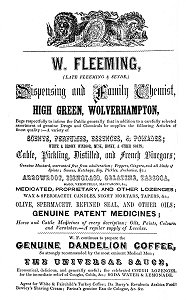 |
W. Fleeming (late Fleeming and Seyde) were at High
Green. He mentions, in small type, that he sells
drugs and chemicals, but he mainly mentions scents,
perfumes, essences and pomades, soaps, various sorts of
vinegar, mustard, pepper, ginger, spices, kethups, soy,
pickles, arrowroot, isinglass, gelatine, tapioca,
medicated and other lozenges, candles, all sorts of lamp
oils, oils, paints, varnishes, "a regular supply of
leeches", horse and cattle medicines, genuine dandelion
coffee, the Universal sauce, soda water, lemonade,
coffee, shaving cream and eau de cologne.
So this was not just a pharmacy, it was something
like a grocer's shop or delicatessen and still with some
elements of the drysalters. |
| W. Hobbins, of 12 Dudley Street, advertises Hobbin's
Balsamic Plaster which cures "the most violent coughs,
colds, asthma, influenza and all pulmonary affections
and local pains"; and Hobbin's Tooth-Ache Powder which
not only cures the hitherto incurable toothache but
also, spasms, especially in the stomach and bowels; and
sudden attacks of epilepsy.
At the foot of the advert Hobbin's Alterative
Condition Powders appear, which appear to cure almost
every known illness or defect in all horses and cattle.
At this time Wolverhampton was not only a market town,
attracting local farmers, but it was full of horses used
for every form of transport. Veterinary
preparations were likely to sell well. |
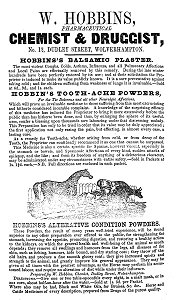 |
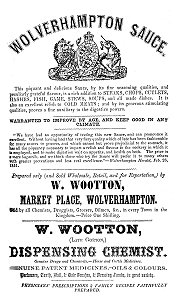 |
W. Wootton (late Gorton), of Market Place, not only
makes up prescriptions but sells patent medicines, oils
and colours, perfumery, nail and hair brushes and
dressing combs. But his chief concern in this
advert is Wolverhampton Sauce. (It might be
remembered that Worcesteshire Sauce was first made by a
local chemist in Worcester). Wolverhampton Sauce
is "piquant and delicious" and has "fine seasoning and a
peculiarly grateful flavour".
Wootton makes and sells this sauce for sale
wholesale, retail and exportation, and he says, perhaps
a little optimistically, that it is "sold by all
chemists, druggists, grocers, oilmen, etc. in every town
in the Kingdom". |
| Robert Jackson's more modest advert shows him as a
chemist, druggist and ginger beer manufacturer.
Many chemists seem to have made what we would call soft
drinks. This line probably emanated from the
selzer drinks, invented as a health drink, early in the
19th century, |
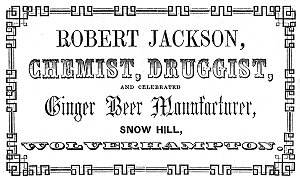 |
Moving on to a trade directory of 1861, not a great deal has
changed. There are still plenty of chemists selling amazing
cure-alls and a wide variety of other goods.
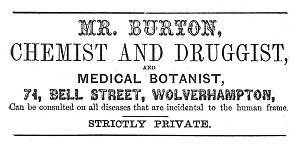 |
Mr. Burton is of interest as he describes himself as
a "medical botanist" which is probably a fancy name for
a herbalist. Note also that he offers "strictly
private" consultations, just as a doctor would do. |
| W. Fleeming, presumably still at High Green, though
he doesn't say where he is, seems to be offering an even
wilder selection of goods, amongst which the fact that
he is the manufacturer of Taraxacum or Dandelion coffee
is almost lost in the small print. He is still the
maker of Universal Sauce but also stocks Staffordshire
Sauce, Worcestershire Sauce, Royal Osbourne and Severn
sauce. Amongst the drinks there is "Schweppes
Soda". New additions reflect two of the obsessions
of the age: "Pulverhamcher's Medical Electric
Chains for Rheumatism" and "Herring's Magnetic Brush and
Comb".
Fleeming also has syphons, syringes and enemas. And he still has "a constant supply of leeches". |
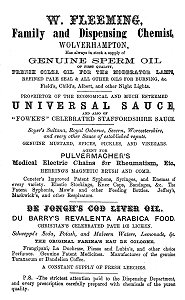 |
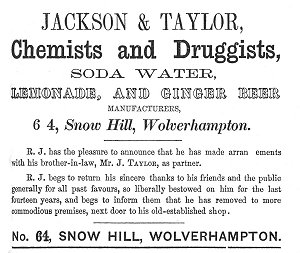 |
Jackson has now taken into partnership his
brother-in-law, Taylor, and they have moved next door
into more commodious premises. |
| Robert Henry Lowe is near the cattle market on the
Bilston Road , so that "farmers and dealers ... will
find his shop most conveniently situated". He
advertises and infallible cough mixture for horses and
cattle, horse condition powders, "traumatic mixture ror
cuts and raw wounds", gripe mixture for horses and
cattle, Irish moss for feeding pigs and cattle, superior
sheep ointment and fly gall ointment and more.
Somewhat alarmingly Lowe also offers to farmers "cheese
and butter colouring". And just as alarmingly he
sells Taylor's Condition Balls and Barber's Poisoned
Wheat. He does not say what these latter items are
used for. |
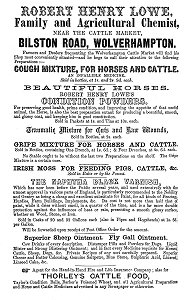 |
|

